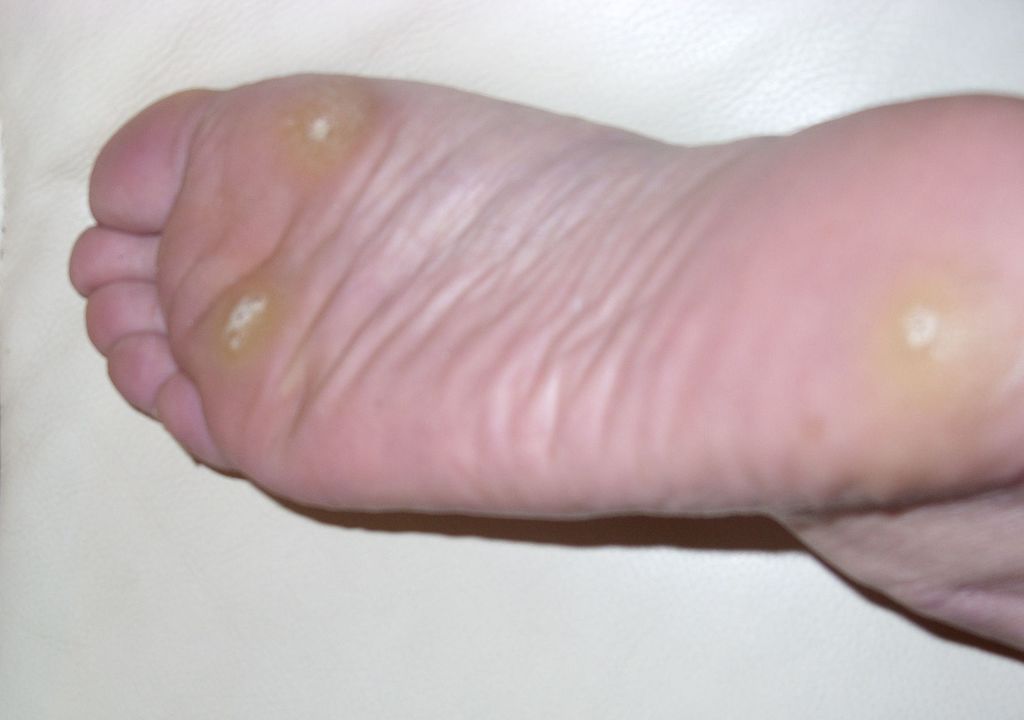If you’re looking for a short answer; yes. Plantar warts are transmitted from one person to the other. This is because they spread through indirect skin contact.
Using the same shower as an infected person exposes you to the virus that triggers plantar warts. Because the warts are transmitted through touch, there is always a chance you might become infected.
This might seem like alarming news, which is why it’s important to ask the question: How contagious are plantar warts?

And here we have some good news. Both plantar and palmer warts have a very low rate of infection. The infection chance is influenced by a number of factors such as skin lesions or if you’ve been sick recently.
While the risk increases when your immune system is weakened, even the healthiest people risk developing a plantar wart.
In this article, we will explain how plantar warts develop and how to prevent plantar warts.
Contents
What Causes Plantar Warts?
Plantar warts are benign tumors caused by the human papillomavirus. Infection happens through cuts in the skin, often too small to be seen by the naked eye.
Plantar warts, in particular, develop underneath your skin, making them harder to treat.
While you are most at risk to become infected if you have cuts, poor health or have had previous warts, even those in top physical condition can become infected.
Most at risk are young children and teens, especially during and immediately after swim classes.
Even adults can be infected if they use public showers or walk barefoot in riskier areas. Use slippers in public spaces such as pools and saunas – when possible – to prevent either spreading or contracting plantar warts.
Where Do Plantar Warts Appear?
Plantar warts appear on your feet, most often on the bottom where your sole comes into contact with the ground. They are the same type of wart as palmer warts, which appear on the palm of your hand.
Plantar warts are mostly a cosmetic problem, posing no medical risks to your personal health.
While inconvenient, they tend to cause less social awkwardness than palmer warts due to their location, since it’s not easy for anyone to see them.
The biggest inconvenience posed is a feeling of unease or mild pain as you go about your daily duties since they put pressure on the bottom of your foot.
How Are Plantar Warts Contagious?
While the risk of developing a plantar wart is rather low, odds increase if someone in your household happens to have one (or multiple) themselves.
The best way to prevent further spreading is by preventing contact between the wart and any surfaces in your home. A simple band-aid that is replaced when necessary suffices for this purpose.

As a courtesy, avoid going to swimming pools and other places where it’s easier to infect strangers.
While plantar warts are transmitted through skin contact, they seldom spread across the foot, so don’t worry about ‘infecting’ your own foot.
Treatment, however, should be followed by a thorough washing of your hands.
Treating Plantar Warts
While plantar wards are not a malicious growth, they might show up in painful or embarrassing places.
Most plantar warts disappear on their own after a certain time, the most stubborn ones lasting a maximum of two years.
If you want to speed things up, visit your local pharmacy. Most pharmacies stock wart treatments for reasonable prices. Some of these might not be efficient or will take several months before results are visible.
If you want quick and reliable results, a visit to the doctor’s office is the only fireproof way. While traditionally warts are frozen with liquid nitrogen, this process is painful if the plantar wart is on the bottom of the foot.
Recently, doctors opt for medicines and vitamins that boost your immune system, encouraging your body to get rid of the infection by itself.

Be aware that plantar warts are more difficult to treat than palmer warts since most of the wart tissue is hiding underneath your skin.
It’s not uncommon for a wart to return, so be sure to complete your treatment even when you believe the wart to be gone before the proposed date.
Conclusion
While plantar warts are contagious, globally speaking, they become less of a risk as you become older. Mostly a problem for children and young teens, they are not dangerous to your personal health.
Proper care, including band-aids and appropriate footwear, helps to prevent spreading this infection. In case of stubborn warts, a doctor’s visit is a good decision.
Most people have a plantar wart at least once in their life, and there are extremely few cases of this requiring medical intervention.
Should you have one, you can rest assured that, while contagious, they are not dangerous – they’re just less than pretty.

